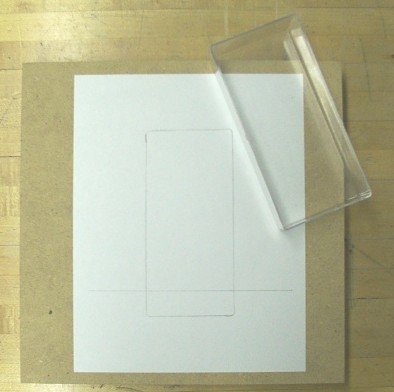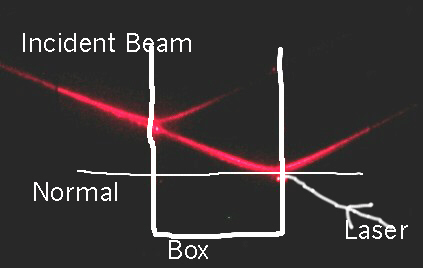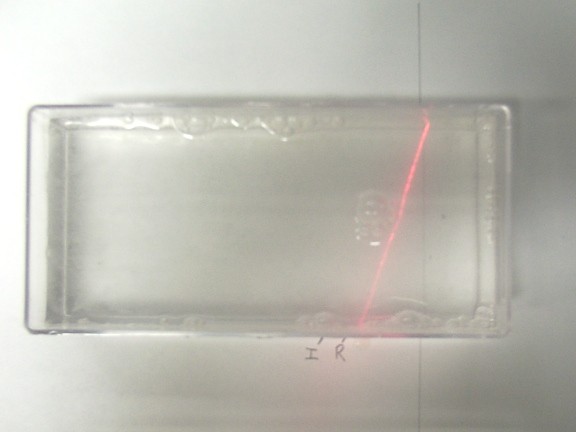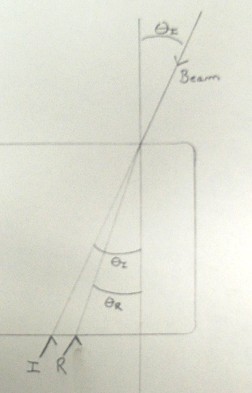Date: Fri Feb 1 08:52:34 2002
Posted By: Robert Arts, Faculty, Physics, Pikeville College
Area of science: Physics
ID: 1011903337.Ph
Message:
Here is a simple procedure for determining the index of refraction of a
liquid. The liquid can be water, alcohol, or any transparent fluid.
1) On a white sheet of paper, trace around a transparent, flat-sided
box. The box that pushpins come in will work fine. On this outline, draw
a normal line to one side and near one edge. See photo "1."
 2) Align the laser so that it strikes the side of the box at the
normal and at an angle to the normal. Anything between 25 and 45 degrees
should work just fine.
3) You will note that the laser passes relatively straight
(neglecting the refraction at the sides of the box) through the box. You
will see a laser spot on the exit side of the box. Mark your paper
directly below this spot. The angle from the normal to this line is the
incident angle. See photo "2."
2) Align the laser so that it strikes the side of the box at the
normal and at an angle to the normal. Anything between 25 and 45 degrees
should work just fine.
3) You will note that the laser passes relatively straight
(neglecting the refraction at the sides of the box) through the box. You
will see a laser spot on the exit side of the box. Mark your paper
directly below this spot. The angle from the normal to this line is the
incident angle. See photo "2."
 4) Slowly fill the box with your liquid. Enough liquid should be
place in the box to "submerge" the laser beam.
5) At this point you will note that the beam has become refracted and
is no longer above the incident point marked on the paper. Mark this new
location on the paper. The angle from the normal to this point is the
refracted angle. See photo "3."
4) Slowly fill the box with your liquid. Enough liquid should be
place in the box to "submerge" the laser beam.
5) At this point you will note that the beam has become refracted and
is no longer above the incident point marked on the paper. Mark this new
location on the paper. The angle from the normal to this point is the
refracted angle. See photo "3."
 6) Remove the liquid and the box. With the normal line and the two
reference points, you can now determine the incident and refracted rays.
The index of refraction of the liquid can easily be calculated from n sin
(theta) = n' sin (theta'). See photo "4."
6) Remove the liquid and the box. With the normal line and the two
reference points, you can now determine the incident and refracted rays.
The index of refraction of the liquid can easily be calculated from n sin
(theta) = n' sin (theta'). See photo "4."
 A simple and very quick and dirty run-through of this procedure resulted
in the index of refraction for tap water to be 1.298. More precise
measurements and greater experimental care can result in a much more
accurate value.
A simple and very quick and dirty run-through of this procedure resulted
in the index of refraction for tap water to be 1.298. More precise
measurements and greater experimental care can result in a much more
accurate value.
Current Queue |
Current Queue for Physics |
Physics archives
Try the links in the MadSci Library for more information on Physics.
MadSci Home | Information |
Search |
Random Knowledge Generator |
MadSci Archives |
Mad Library | MAD Labs |
MAD FAQs |
Ask a ? |
Join Us! |
Help Support MadSci
MadSci Network,
webadmin@www.madsci.org
© 1995-2001. All rights reserved.
 2) Align the laser so that it strikes the side of the box at the
normal and at an angle to the normal. Anything between 25 and 45 degrees
should work just fine.
3) You will note that the laser passes relatively straight
(neglecting the refraction at the sides of the box) through the box. You
will see a laser spot on the exit side of the box. Mark your paper
directly below this spot. The angle from the normal to this line is the
incident angle. See photo "2."
2) Align the laser so that it strikes the side of the box at the
normal and at an angle to the normal. Anything between 25 and 45 degrees
should work just fine.
3) You will note that the laser passes relatively straight
(neglecting the refraction at the sides of the box) through the box. You
will see a laser spot on the exit side of the box. Mark your paper
directly below this spot. The angle from the normal to this line is the
incident angle. See photo "2."
 4) Slowly fill the box with your liquid. Enough liquid should be
place in the box to "submerge" the laser beam.
5) At this point you will note that the beam has become refracted and
is no longer above the incident point marked on the paper. Mark this new
location on the paper. The angle from the normal to this point is the
refracted angle. See photo "3."
4) Slowly fill the box with your liquid. Enough liquid should be
place in the box to "submerge" the laser beam.
5) At this point you will note that the beam has become refracted and
is no longer above the incident point marked on the paper. Mark this new
location on the paper. The angle from the normal to this point is the
refracted angle. See photo "3."
 6) Remove the liquid and the box. With the normal line and the two
reference points, you can now determine the incident and refracted rays.
The index of refraction of the liquid can easily be calculated from n sin
(theta) = n' sin (theta'). See photo "4."
6) Remove the liquid and the box. With the normal line and the two
reference points, you can now determine the incident and refracted rays.
The index of refraction of the liquid can easily be calculated from n sin
(theta) = n' sin (theta'). See photo "4."
 A simple and very quick and dirty run-through of this procedure resulted
in the index of refraction for tap water to be 1.298. More precise
measurements and greater experimental care can result in a much more
accurate value.
A simple and very quick and dirty run-through of this procedure resulted
in the index of refraction for tap water to be 1.298. More precise
measurements and greater experimental care can result in a much more
accurate value.